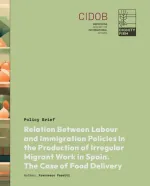Relation Between Labour and Immigration Policies in the Production of Irregular Migrant Work in Spain. The Case of Food Delivery.

Policy Brief (September 2025)
The food delivery sector in Spain has undergone a significant transformation since the emergence of digital platforms such as Glovo, Uber Eats, and Just Eat. These platforms have redefined the organisation of a specific labour market sector, introducing algorithmic management, flexible scheduling, and low entry barriers. While these features have facilitated rapid sectoral growth, they have also exposed critical regulatory blind spots, particularly at the intersection of labour and immigration policies.
Spain’s legislative response—most notably the Riders Law (Royal Decree-Law 9/2021 and Law 12/2021)—has been internationally recognised for its attempt to reclassify riders as employees and mandate algorithmic transparency. However, the implementation of this law has been uneven, and its impact limited by platform resistance, legal ambiguity, and enforcement deficits Crucially, the law operates within a fragmented regulatory framework that overlooks the specific legal and administrative constraints faced by migrant workers, many of whom are unable to access formal employment due to restrictions on residence and/or work authorisation.
The intersection of labour and migration policies (including asylum regulation) plays a critical role in shaping Spain’s food delivery sector. Migrants, often excluded from formal employment due to administrative constraints, are absorbed into the workforce through informal mechanisms, making irregular work a structural feature of platform-based delivery.